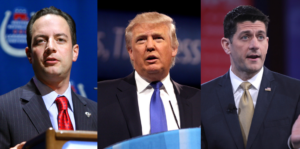What’s Actually Inside the GOP’s Obamacare Repeal Draft?
Here’s What You Need to Know
Last week, a draft of a House Republican bill designed to repeal and replace Obamacare was leaked. The legislation is a first look at how House Republicans, working with the Trump Administration, are planning to break down the policies of Obamacare while simultaneously replacing key elements of the healthcare reform law.
The main points of the leaked proposal include:
- Trading The Individual Mandate For Individual Penalties: The GOP draft proposal does eliminate Obamacare’s individual mandate, but establishes penalties for individuals who fail to maintain consistent coverage. Specifically, the penalty punishes those who re-enroll in the healthcare marketplace by increasing their premiums by 30% for one year. This mechanism would replace the individual mandate as a tool to disincentive people from only getting health coverage when they get sick.
- Changing Subsidies To Tax Credits: The Republican plan also eliminates Obamacare’s expansive income-based subsidies, and instead creates a system of age-based tax credits. Beginning in 2020, persons under 30 would receive a tax credit of $2,000, and that amount would increase by $500 each decade beyond 30 until age 60 when the tax credits would cap at $4,000.
- Creating “State Innovation Grants”: One area Obamacare received bipartisan support was the law’s handling of pre-existing medical conditions. The Republican plan looks to maintain that success through the creation of “state innovation grants,” offering the states federal money to establish high-risk pools for those people with pre-existing conditions.
- Big Changes For Medicaid: The GOP draft measure also seriously rolls back Obamacare-driven Medicaid spending, completely eliminating the law’s Medicaid expansion by 2020. The measure also reforms the pre-Obamacare Medicaid system by converting it to per-capita subsidies, in which states are given the latitude to build safety-net health insurance programs with federal funding in the form of a fixed dollar amount for each Medicaid enrollee resident within their borders.
- Eliminating Taxes, And Some Tax Breaks: Another fundamental of the Republican plan is the elimination of all taxes associated with Obamacare. However, in order to pay for the tax credits and grants in the new plan, Republicans would also eliminate tax breaks on generous health plans offered by employers. This proposal is notably similar to Obamacare’s controversial “Cadillac tax,” which Republicans actively opposed and received fierce criticism on from businesses and labor unions alike. Should this remain in a final GOP plan, it would likely be a major political fight and elicit cries of hypocrisy from Democrats.
The response to this “discussion draft” has been less than heartening for anyone betting on its success. Beyond predictable Democratic opposition, conservative Republicans criticized the legislation for not going far enough in efforts to erase several key Obamacare policies. Senator Rand Paul underscored this opposition by calling the plan “Obamacare lite” while the Heritage Foundation released their own version of a repeal-and-replace plan to push back against GOP leadership efforts.President Trump discussed the repeal-and-replacement of Obamacare during his address to the joint session of Congress this Tuesday night, yet both establishment and conservative Republicans claim the President endorsed their version. Speaker Ryan has said House Republicans hope to present their Obamacare repeal legislation after the coming recess, but this draft illustrates just how far they have to go before reaching something that will be able to muster anything resembling consensus.
Subscribe to Receive Insights
"*" indicates required fields
News You Can Use
RUSSIAN DIPLOMAT DEATHS. Since last November, six Russian diplomats and an aide to a former deputy prime minister have died suddenly, and almost all on foreign soil. The Russian Ambassador to Turkey, Andrei Karlov, was very publicly assassinated the same day a long-time diplomat in Moscow, Peter Polshikov, was shot dead. Not to mention, senior Russian diplomats in India, Greece, and at the United Nations have also died suddenly. There have been other cases over the past decade where Russian officials have either died mysteriously or were very clearly poisoned, yet no conclusions have been made about what these deaths might mean. The international community is taking note of them and waiting to see what happens next.
NO MOVING OUT FOR MILLENNIALS. Owning a home has always been a rite of passage for success and adulthood in America. But as Millennials approach an age when home ownership has traditionally become a reality, they are finding it still a far-off fantasy. Beyond the constraints of crippling student debt and a weak job market, even Millennials who have found better-paying jobs appear locked out of the housing market thanks to the record-low number of homes available for sale. And of those homes that are on the market, few are priced at a value accessible to first-time buyers. Since home ownership creates wealth over time, this could result in a shrinking of American wealth in decades to come, along with another implosion of the housing market as fewer and fewer people are able to afford purchasing homes.
OCCUPATIONAL OPTIMISM. Americans have record-breaking optimism for the future of the labor market, with a recent University of Michigan study showing 35% of U.S. consumers surveyed expecting unemployment to further decline in the coming year. This is the largest share of respondents reacting positively since March 1984. Since bringing jobs back to America was a fundamental promise of President Trump’s campaign, it appears American consumers are taking him at his word, believing in his ability to deliver on that promise. How Trump’s policies help the middle class versus those in other income brackets will be critical to whether that optimism continues.
PAST VS. PRESENT PRESS. Now is likely the most consequential time for the American journalism in a generation. With online and citizen journalism breaking down the monolith of the media, and the drive to beat competitors outpacing the necessity of getting the story right, Senior Fellow at the Hudson Institute Lee Smith recently described “the death of the American press” happening before our eyes. Smith argues the press coverage of alleged links between Donald Trump and Russia, based largely on an unverified dossier, illustrate the sorry state of American journalism today. Smith takes a critical line with this “investigative” reporting, contrasting it with the tireless research of his former colleague at the Village Voice Wayne Barrett. Barrett spent decades covering Donald Trump, and Smith argues, if the President actually had a connection to the Kremlin, Barrett and his team of well-trained reporters would have discovered it because they relied on cross-checked and verified sources. Smith also argues the Trump-Russia coverage exposes how the present-day press all feed from the same trough of information – relying on the same cadre of Washington and New York insiders – because it is all they know how to do at this point. Smith concludes that when the media focused on an ad-driven business model, deciding content had no actual value, they permanently devalued news and gave birth to the untrusted media of today.
DEAR DE BLASIO. Last week, New York City Mayor Bill de Blasio spent almost five hours being interviewed by federal prosecutors probing whether the Mayor and his advisors exchanged favors to donors for contributions to his 2013 campaign, and his now-shuttered non-profit, the Campaign for One New York. The corruption-busting U.S. Attorney for the Southern District of New York, Preet Bharara, sent a clear message to de Blasio: federal prosecutors are taking the charges against the Mayor very seriously. Just this week, de Blasio actually admitted to doing favors for friends and community allies who needed help with city business, but argued it was acceptable because he never pressured agency heads to do anything. The U.S. Attorney’s investigation is focused on whether de Blasio traded favors for campaign contributions from New York landlord Moishe Indig. De Blasio is also still currently being investigated by the Manhattan District Attorney’s Office for allegedly steering campaign donations to state Senate campaign committees to circumvent campaign-donation limits in 2014. The federal corruption investigation is apparently being led by the public corruption team that took down former New York politicos Sheldon Silver and Dean Skelos, suggesting Mayor de Blasio may soon be suffering the same fate.
CHANGING DEMOGRAPHICS DON’T EQUAL CHANGING POLITICS. There is no question the demographics of the United States are changing, but despite what some think, this evolution is not likely to translate to a serious shift in American political ideology. The center-left think tank, Third Way, recently explained why suggestions that these demographic shifts will result in an overwhelming political advantage for the Democratic Party is inaccurate and flawed in its logic. First, these demographic changes are not evenly distributed throughout states and voting districts of the country. Second, Americans change their voting behavior far more regularly than any of the models predicting Democratic demographic dominance. And finally, even when taking into account these demographic changes, self-identified liberals are only the third largest portion of the electorate behind conservatives and moderates. In essence, Democratic claims that changing demographics equals Democratic dynasty is wrong, and Democrats have work to do to broaden their message if they hope to earn political dominance.



